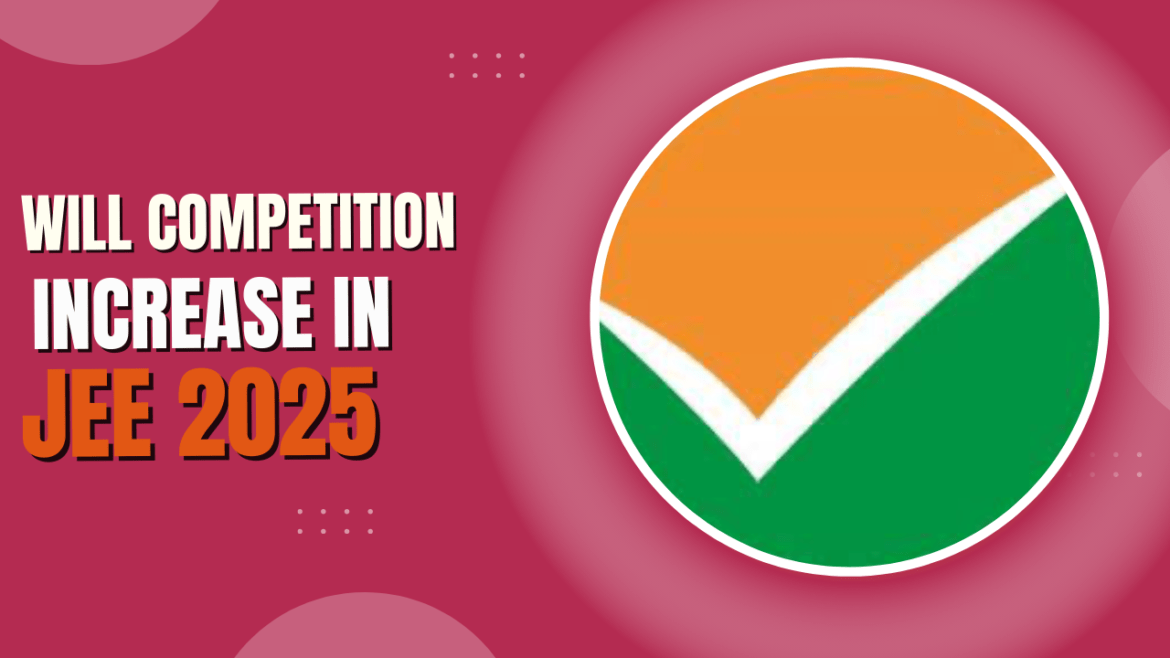The Joint Entrance Examination (JEE) has long been a benchmark for engineering aspirants in India, serving as the gateway to prestigious institutions like the Indian Institutes of Technology (IITs) and National Institutes of Technology (NITs). As we approach 2025, a pertinent question arises: Will competition increase in JEE 2025? This article delves into various factors influencing the JEE competition, providing insights for future aspirants.
Rising Number of Applicants
One of the primary indicators of increasing JEE competition is the surge in the number of applicants. In 2024, approximately 14 lakh students registered for JEE Main, and projections for 2025 suggest this number could rise to 15-16 lakh. This upward trend signifies heightened competition, as more students vie for a limited number of seats in premier engineering colleges.
The reasons behind this increase include:
- Growing interest in engineering disciplines due to advancements in AI, machine learning, and data science.
- More accessibility to coaching centers and online study materials, allowing students from rural areas to compete effectively.
- The appeal of IITs, NITs, and IIITs as the best institutes for technical education in India, leading to more applicants.
- Government initiatives encouraging STEM education, leading to a larger pool of students preparing for JEE.
Changes in Examination Attempts
The Joint Admission Board (JAB) introduced a significant change by increasing the number of attempts for JEE Advanced from two to three in November 2024. However, this decision was later reversed, reinstating the original two-attempt limit. This brief window led some students to alter their preparation strategies, potentially intensifying the JEE competition for 2025.
This shift affects competition in the following ways:
- Aspirants must prepare thoroughly in fewer attempts, leading to higher preparation intensity.
- More students reattempting JEE after their first failure, increasing the applicant pool for subsequent years.
- Higher pressure on first-time candidates due to limited chances at securing a seat in IITs.
Anticipated Increase in Cutoff Scores
With the projected rise in applicants, it’s plausible to expect an increase in cutoff scores for JEE 2025. Higher cutoffs are a natural consequence of intensified competition, as institutions aim to select the most qualified candidates from a larger pool. Aspirants should prepare accordingly, focusing on strengthening their conceptual understanding and problem-solving skills to meet these elevated benchmarks.
Expected changes in JEE cutoffs:
- Higher competition means fewer seats per applicant, leading to an increased cutoff.
- More students securing high marks due to better coaching and resources.
- A greater emphasis on conceptual clarity and speed in answering questions.
- Students must focus on accuracy to minimize negative marking effects.
Factors Contributing to Increased Competition
Several elements contribute to the escalating JEE competition:
1. Awareness and Accessibility
The proliferation of online learning platforms and coaching centers has made quality preparation resources more accessible, enabling a broader spectrum of students to compete effectively. Students now have access to:
- Live and recorded lectures from the best coaching institutes.
- Doubt-solving sessions to clarify difficult concepts.
- AI-based learning models to analyze performance and suggest improvements.
2. Policy Changes
Modifications in examination policies, such as changes in the number of attempts or eligibility criteria, can influence the number of candidates and the competitive landscape.
- The rollback of the three-attempt rule may increase the number of droppers appearing in JEE 2025.
- The introduction of percentile-based normalization makes competition stiffer, as candidates must score high to secure ranks.
3. Economic Growth
As India’s economy expands, more families are able to invest in their children’s education, leading to an increase in the number of aspirants aiming for top engineering institutes.
- More students from Tier-2 and Tier-3 cities are competing in JEE.
- Parents willing to invest in premium coaching institutes and online courses.
4. Success Stories
High-profile success stories of JEE toppers from diverse backgrounds inspire more students to pursue engineering, contributing to the growing applicant pool. The rise of social media influencers in the education sector has further fueled motivation among students.
Implications for Aspirants
Given the anticipated rise in JEE competition, aspirants should consider the following strategies:
- Early Preparation: Starting early allows for a comprehensive understanding of the syllabus and ample time for revision.
- Consistent Practice: Regular problem-solving and mock tests help in identifying weak areas and improving time management skills.
- Resource Utilization: Leveraging quality study materials, online courses, and guidance from mentors can provide a competitive edge.
- Mental Well-being: Maintaining a balanced routine with adequate rest and recreational activities is crucial to prevent burnout.
- Focus on Accuracy: Since negative marking plays a role, students must avoid guessing and focus on solving questions with certainty.
- Developing Speed and Efficiency: Since JEE is time-bound, solving questions quickly while maintaining accuracy is critical.
Conclusion
The JEE competition in 2025 is poised to intensify due to an increasing number of applicants and evolving educational dynamics. Aspirants must adopt a strategic and holistic approach to their preparation, focusing on conceptual clarity, consistent practice, and mental well-being to navigate this competitive landscape successfully. As competition continues to rise, the key to securing a top rank lies in diligent preparation, strategic revision, and maintaining a positive mindset throughout the journey.
FAQs on Will Competition Increase in JEE 2025
As of now, there are no official announcements regarding changes in the JEE 2025 examination pattern. Aspirants are advised to regularly check official sources for updates.
While the number of applicants may influence cutoff scores, the examination’s difficulty level is determined by the organizing body and is designed to assess a candidate’s aptitude effectively.
Incorporating regular breaks, engaging in physical activities, practicing mindfulness, and seeking support from peers or mentors can help manage stress during preparation.
Currently, there are no announced changes to the eligibility criteria. However, candidates should stay informed through official communications for any updates.
Mock tests are vital as they simulate exam conditions, help in time management, and identify areas requiring improvement, thereby enhancing overall performance.


